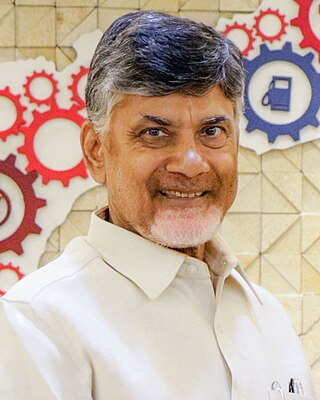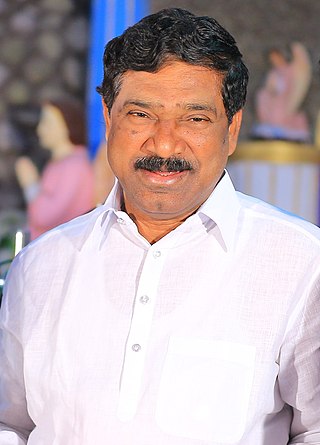Related Research Articles

Nara Chandrababu Naidu, also known as Chandrababu Naidu or CBN, is an Indian politician and the current Leader of Opposition in the Andhra Pradesh Legislative Assembly. Naidu served as Chief Minister from 1995 to 2004 and as Opposition Leader from 2004 to 2014 in the erstwhile Andhra Pradesh. He held the position of Chief Minister for the third time in the bifurcated Andhra Pradesh from 2014 to 2019. Presently in his eighth term as a legislator, he holds the record for being the longest-tenured Chief Minister in United Andhra Pradesh. He is the National President of the Telugu Desam Party (TDP).
Mala is a Telugu caste from the Indian states of Andhra Pradesh and Telangana. They are also present in smaller numbers in the states of Karnataka and Maharashtra. They are considered as Scheduled Caste (SC) by the Government of India. According to 2001 census data, Malas constituted 41.6 percent of the Scheduled Castes population in the then state of Andhra Pradesh, which also included the present state of Telangana.

Dalit, also previously known as untouchables, is the lowest stratum of the castes in the Indian subcontinent. Dalits were excluded from the four-fold varna system of Hinduism and were seen as forming a fifth varna, also known by the name of Panchama. Dalits predominantly follow Hinduism, with significant populations of the adherents of Buddhism, Sikhism, Christianity, and Islam. Scheduled Castes is the official term for Dalits, who get reservation under Positive discrimination, as per the constitution of India.
The Other Backward Class (OBC) is a collective term used by the Government of India to classify castes which are educationally or socially backward. It is one of several official classifications of the population of India, along with general castes, Scheduled Castes and Scheduled Tribes (SCs and STs). The OBCs were found to comprise 52% of the country's population by the Mandal Commission report of 1980, and were determined to be 41% in 2006 when the National Sample Survey Organisation took place. There is substantial debate over the exact number of OBCs in India; it is generally estimated to be sizable, but many believe that it is higher than the figures quoted by either the Mandal Commission or the National Sample Survey.

The Scheduled Castes (SCs) and Scheduled Tribes (STs) are officially designated groups of people and among the most disadvantaged socio-economic groups in India. The terms are recognized in the Constitution of India and the groups are designated in one or other of the categories. For much of the period of British rule in the Indian subcontinent, they were known as the Depressed Classes.
The Mandal Commission or the Socially and Educationally Backward Classes Commission (SEBC), was established in India in 1979 by the Janata Party government under Prime Minister Morarji Desai with a mandate to "identify the socially or educationally backward classes" of India. It was headed by B. P. Mandal, an Indian parliamentarian, to consider the question of reservations for people to address caste discrimination, and used eleven social, economic, and educational indicators to determine backwardness. In 1980, based on its rationale that OBCs identified on the basis of caste, social, economic indicators made up 52% of India's population, the commission's report recommended that members of Other Backward Classes (OBC) be granted reservations to 27% of jobs under the Central government and public sector undertakings, thus making the total number of reservations for SC, ST and OBC to 49.5%.

Madiga is a Telugu caste from southern India. They mainly live in the states of Andhra Pradesh, Telangana and Karnataka, with a small minority in Tamil Nadu. Madigas are historically associated with the work of tannery, leatherwork and small handicrafts. Today, most are agricultural labourers. They are categorized as a Scheduled Caste by the Government of India. Within the Madiga community, there are various sub-castes include Bindla, Chindu, Dakkali and Mashti.
Kapu is a Hindu caste mainly found in the Indian state of Andhra Pradesh. They are classified as a Forward caste. They are a community of land-owning agriculturists. Historically, they have also been warriors and military generals (Nayakas) in Hindu armies. They are a dominant caste of Andhra Pradesh. Kapus commonly carry the title Naidu. They are primarily present in Coastal Andhra with major concentration in the Godavari-Krishna delta region.
Reservation is a system of affirmative action in India that provides historically disadvantaged groups representation in education, employment, government schemes, scholarships and politics. Based on provisions in the Indian Constitution, it allows the Union Government and the States and Territories of India to set reserved quotas or seats, at particular percentage in Education Admissions, Employments, Political Bodies, Promotions, etc, for "socially and educationally backward citizens."

The 2006 Indian anti-reservation protests were a series of protests that took place in India in 2006 in opposition to the decision of the Union Government of India, led by the Indian National Congress-headed multiparty coalition United Progressive Alliance, to implement reservations for the Other Backward Classes (OBCs) in central and private institutes of higher education. These protests were one of the two major protests against the Indian reservation system, the other one being the 1990 anti-Mandal protests.
Adi-Andhra is a Telugu caste found in the Indian states of Andhra Pradesh and Telangana, primarily in the Coastal Andhra region. They are categorised as a Scheduled Caste by the Government of India.
Forward caste is a term used in India to denote castes which are not listed in SC, ST or OBC reservation lists. They are on average considered ahead of other castes economically and educationally. They account for about 30.8% of the population based on Schedule 10 of available data from the National Sample Survey Organisation 55th (1999–2000) and National Sample Survey Organisation 61st Rounds (2004–05) Round Survey.
Madiga Reservation Porata Samiti or MRPS is a not-for profit organisation formed to demand the categorisation of the SC reservation quota in Andhra Pradesh and states of India to ensure equitable distribution of state allocations for all the constituent Dalit castes, including the Madiga. It was formed under the leadership of kalva ravi madiga in 1994 and is currently headed by

Manda Krishna Madiga, born as Yellaiah on July 7, 1965, is a prominent Indian politician and activist known for his unwavering commitment to the rights of the marginalized Madiga community. His journey from early anti-caste activism in the 1980s to founding the Madiga Reservation Porata Samiti in 1994 and adding the Madiga surname has been marked by advocacy efforts spanning issues such as caste discrimination, children's health, and disability rights.

Dr. Thatikonda Rajaiah is an Indian politician and present MLA for Station Ghanpur assembly constituency representing the Bharat Rashtra Samithi. He joined Bharat Rashtra Samithi on 30 October 2011. He was sworn in as deputy chief minister of Telangana state on 2 June 2014 along with Md. Mohamood Ali deputy chief minister of Telangana. Chief Minister K. Chandrasekhar Rao on 25 January 2015 fired Deputy Chief Minister and Health Minister T. Rajaiah in the wake of adverse reports about his functioning and failure to take preventive measures in controlling swine flu in Telangana.
Karem Sivaji is the founder and national president of Mala Mahanadu. He is the leading voice of the Mala community. He is the prominent face of Mala community voicing the community's stand in Print and Electronic Media. He is appointed as the first chairman of Sc,St Commission of the divided Andhra state under the Honourable Chief minister Sri Nara Chandrababu Naidu garu.
Katti Padma Rao is a Dalit poet, scholar and activist from Andhra Pradesh, India. He is the founding general secretary of Dalit Mahasabha, a people's organisation that spearheaded the Dalit movement in Andhra Pradesh in the aftermath of the 1985 Karamchedu massacre in the coastal region of that state. A scholar in both Telugu and Sanskrit, he has published several volumes of poetry, and books on sociology, religion, philosophy, history, and women's studies. He is a regular columnist in major Telugu newspapers and magazines.
Karamchedu massacre refers to an incident that occurred in Karamchedu, Bapatla district of Andhra Pradesh on 17 July 1985, where brutality by Kamma landlords against Madigas (Dalits) resulted in the killing of six Madigas and grievous injuries to many others. Three Madiga women were raped. Hundreds of Madigas in the village were displaced from their home after their houses were burnt and looted.

The 2019 Andhra Pradesh Legislative Assembly elections were held in the Indian state of Andhra Pradesh on 11 April 2019 for constituting the fifteenth legislative assembly in the state. They were held alongside the 2019 Indian general election.
References
- ↑ "P.V. Rao vs Director, Dept. Of Information ..on 25 August, 1999".
- ↑ "Andhra HC upholds categorisation of SCs".
- ↑ "MRPS, Mala Mahanadu take opposite stands on verdict". The Hindu . Chennai, India. 9 November 2000. Archived from the original on 4 October 2012. Retrieved 26 July 2016.
- ↑ "Apex court quashes AP`s legislation on reservation".
- ↑ "SC quashes Andhra reservation law as unconstitutional". The Times of India . 5 November 2004. Archived from the original on 24 September 2012.
- ↑ "S.C. rules against quota within quota". The Hindu . Chennai, India. 6 November 2004. Archived from the original on 12 February 2005.
- ↑ "Mala Mahanadu for restraint". The Hindu . Chennai, India. 7 November 2004. Archived from the original on 15 April 2005.
- ↑ "Mala Mahanadu chief passes away". The Hindu . Chennai, India. 24 December 2005. Archived from the original on 16 February 2006.
- ↑ "Plea to install statue of Mala Mahanadu leader". The Hindu . Chennai, India. 23 December 2006. Archived from the original on 5 December 2007.